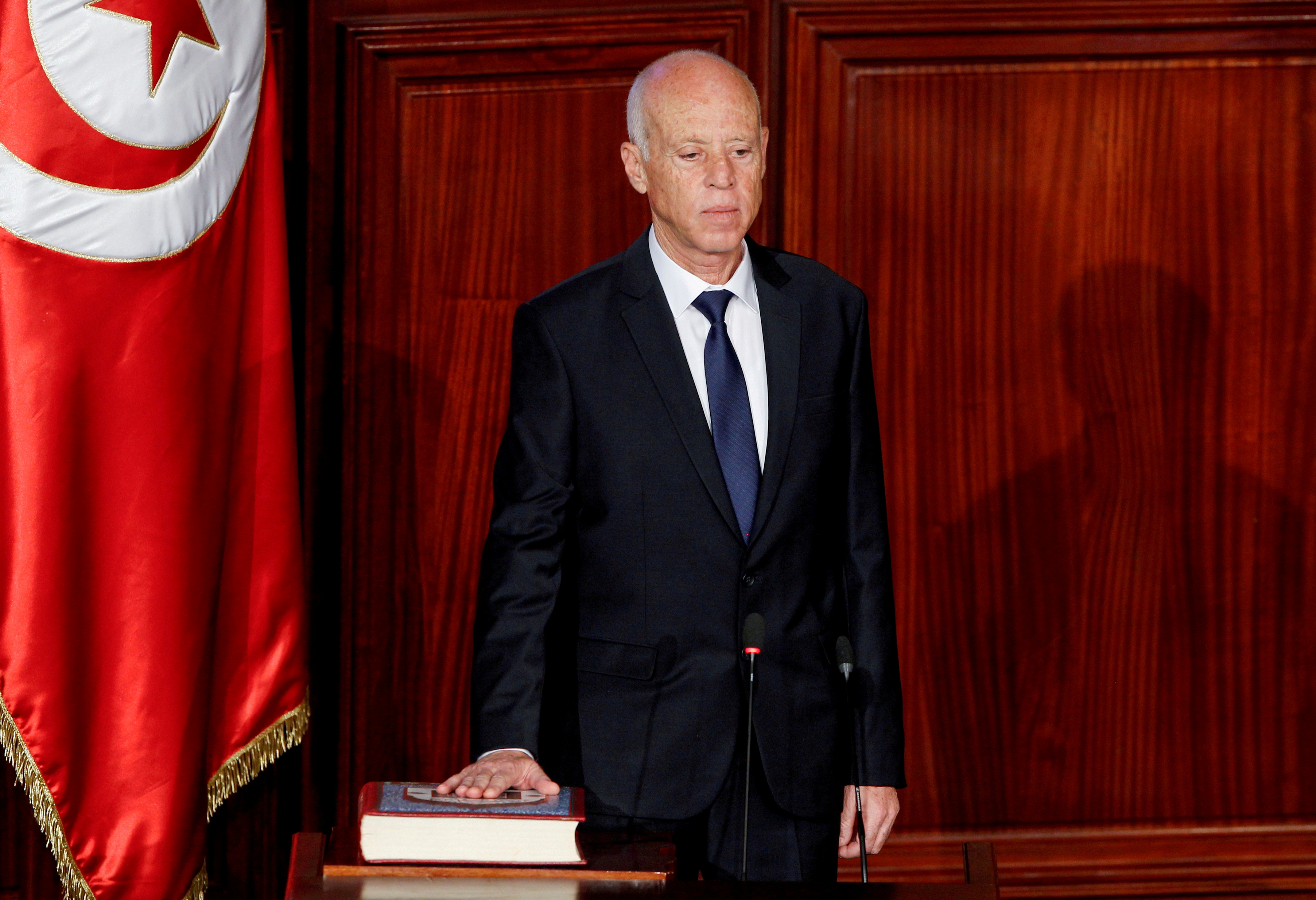Following Tunisia’s revolution in 2011, which heralded uprisings across the Arab world, the country came to enjoy one of the most open media environments in the region. Journalism has thrived, with outlets able to scrutinise political leaders and critically discuss the nation’s direction. This, however, is now under grave threat.
Last month, Tunisia’s President Kais Saied issued a decree that imposes fines and jail time for producing and disseminating “rumours and fake news”. Anyone found to “produce, promote, publish, transmit or prepare false news, statements, rumours or forged documents” can be jailed for up to five years or up to ten if the target of misinformation is an official.
[perfectpullquote align=”left” bordertop=”false” cite=”” link=”” color=”” class=”” size=””]In a world increasingly destabilised by the spread of disinformation, this approach might seem laudable. In reality, it is the latest in a series of power grabs by an increasingly autocratic leader designed to smother free expression and remove mechanisms of accountability.[/perfectpullquote]
Earlier this year, for instance, Saied’s government issued a circular that requires ministers to obtain permission from the Prime Minister’s office before communicating with the media, further interrupting the flow of information between journalists and officials.
Much of the threat the new law poses lies in its language, which is notably vague – likely deliberately so. The decree does not offer any definition of expressions such as “public order,” “public security,” or “rumours and fake news.” Such unclear legislation gives authorities wide interpretation of the crime and undue power to patrol free speech.
Even the confidentiality of correspondence, hitherto protected by the constitution, is imperilled. The human rights non-profit Euromed Monitor has observed that the decree “legalises the breaching and monitoring of individuals’ communications and data, robbing them of the right to maintain confidentiality…and grants authorities access to all of their private data”.
Imposing such punitive measures on a free press will scare potential sources into silence and curtail journalists’ ability to hold power accountable. Mehdi Jelassi, head of the National Syndicate of Tunisian Journalists, has described the information law as “a severe blow to the values of the revolution”. Reporters Without Borders condemned the decree as “draconian,” warning that it will create a climate of fear and self-censorship that will “facilitate the fake news this decree is supposed to combat”. Amnesty International has noted that another decree, issued this March under the guise of preventing speculation on goods, would also impose jail sentences for anyone commenting negatively on government economic policy.
Major changes to Tunisia’s social and political life are now mere presidential announcements rather than the product of a healthy, participatory democratic process. A decade after the revolution against the 30-year Ben Ali dictatorship, the country is again slipping into one-man rule. In 2021, Saied fired his Prime Minister, suspended parliament, and gave himself sweeping judicial powers, including the ability to rule by decree unilaterally.
To legitimise his self-coup last year, Saied drew up a new version of the constitution this year. A top Tunisian jurist who oversaw the draft would later disown it, stating that it had been altered to such an extent that it could pave the way for a “disgraceful dictatorial regime”. Nevertheless, the draft was passed in a plebiscite despite an opposition boycott and a turnout of less than a third.
With such a clear intention to push Tunisia towards unilateral rule, it is obvious that President Saied seeks to silence one of the region’s most thriving media spaces. There is, in principle, nothing wrong with countering misinformation and protecting individuals against libel and slander, but his decree does little more than give the government the ability to control the message.
According to Article 19, a freedom of expression organisation, there are several less restrictive measures the Saied regime could have taken if it genuinely wanted to combat fake news. These include “the promotion of independent fact-checking mechanisms, state support for independent, diversified public service media, and education and media literacy.” The authorities have chosen not to engage with any of these options.
Instead, they had opted for the most authoritarian approach and, even before Saied’s announcement, were prosecuting Ghazi Chaouachi, Secretary General of the opposition Al Tayar Al Dimocrati, on charges of spreading rumours after he criticised the prime minister on a radio show. The new decree enshrines these rising crackdowns on free speech and persecution of opposition figures.
It is not unusual to seek to change a political system, but the kind of unilateral, undemocratic decrees mandated by President Saied in the last year are morphing the system beyond all recognition. We have reached the point where we must ask: is Tunisia still a democracy? The sad answer is that it looks less like one with every passing day. And things will only get worse if the international community stands by, if Tunisian civil society’s efforts come to naught and if Saied is allowed to ride roughshod over one of Tunisia’s hardest-won freedoms.
Ines El Jaibi is a Tunisian lawyer and human rights activist.
This article first appeared in the African Arguments.
Photo by Zoubeir Souissi.

